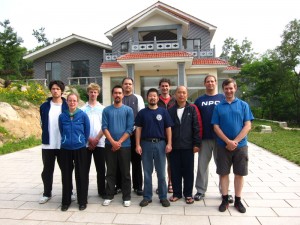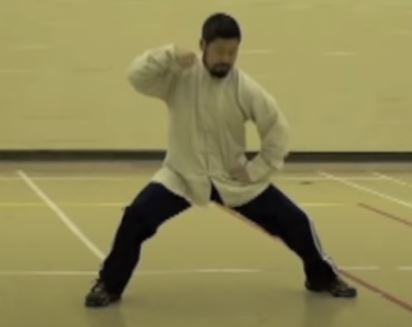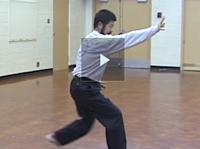[singlepic id=3735 w=150 h=150 float=left]for the week-long national holiday, i took the opportunity to take a break from my studies in beijing and visit daqingshan. even though master chen was not there, the memories of my two summers training on the mountain were still fresh in my mind and inspired my training every day.
charlie gordon
Master Chen has stated that any similarities between Taijiquan and other martial arts are superficial. To be unaware of this point is to risk wandering off-course on the Taiji path.
Many more Chinese martial artists have visited Daqingshan this year compared to last, with various Taijiquan styles, Yiquan, Tongbeiquan, Baguazhang, Xingyiquan and Shaolinquan all being represented.Many have come from Linyi, a near-by city known in Shandong for its martial arts pedigree. Shandong itself is a province famous for its long and deep martial history in China. Outwardly these martial artists say they come to learn from Master Chen, however most if not all come to test his skill.
During a break from the constant stream of guests, Master Chen explained that all of his visitors come with their minds already made up, and thus will never be able to learn. “People will always believe what they want to believe, no matter how skillful you are”. No matter the outcome of these encounters, they all return home continuing to believe what they think they know about Master Chen and “real” Taiji skills. He then went on to describe people’s reactions after pushing with him, and how their minds get in the way of learning:
After pushing with Master Chen everyone’s reaction is the same: “He’s too strong. He’s just stronger than I am”.
After this experience, the correct progression of thought should be:
“No, it’s not just that he’s stronger than I am, it’s something he does”. Then,
“I can only be strong like him if I do what he does” (Practical Method).
However, after experiencing Master Chen’s power people react in the following ways:
“He’s stronger because he is younger – it’s not proper Taiji”. Or,
“He’s strong and fast. He got me this time but I’ll get him next time”. Or,
“I don’t understand it, I don’t like it, and I don’t want to try it”. Or,
“I want to be strong like him so I’ll learn his tricks and put them in my own form”.
Most visitors’ reactions fall into one of the top three but a few have been of the fourth, and so they returned to Daqingshan to learn from Master Chen. But according to him they will never succeed in learning because both their logic and their understanding of Taiji are flawed. Master Chen has no tricks, he has the Practical Method.
Master Chen recounted a story of Master Hong to illustrate how having pre-conceived ideas of Taiji inhibits learning. After moving back to Jinan from Beijing, Master Hong taught in many locations in Jinan and eventually ended up teaching at the Jinan Martial Arts Academy. For over 10 years Hong taught daily in the same gymnasium with Wushu instructor Master Wu. Wu thought Hong was a fake – his Taiji ridiculous – and for 10 years he had never shared a word with nor touched Master Hong.
One day while Master Hong was demonstrating a technique on a student, Master Wu had had enough – after teaching side-by-side with Hong for so many years, he could no longer stand to see this old man continue to cheat his students. Interrupting Master and student, Master Wu requested Hong to demonstrate the technique on himself instead, thinking he would finally expose Hong for the fraud he was. Upon first touch Master Wu was immediately thrown against the wall. In all his martial arts experience Master Wu had never felt anything like Hong’s energy. Completely surprised yet unhurt, Master Wu promptly requested to become a disciple of Master Hong. Imagine being Master Wu and realizing that you had wasted an opportunity to train every day with a high level Master for 10 years!
However, Master Chen raised this subject not out of despair but out of hope, for he said that for the first time in his teaching career he encountered a student who came to test him and came away from the encounter with the right mind towards learning. A fellow Taiji brother (Let’s call him Liu) of mine had studied another Chen Style Taijiquan for over 10 years when he first met Master Chen. He came to Daqingshan dissatisfied with his previous training, and when he first pushed with Master Chen he didn’t understand – he had never experienced anything like it, and from such a small man at that.
Liu had planned to spend 6 days training on Daqingshan, and at the end of the first day he thought to himself, “I need to lift more weights and train harder to beat him”.
After the second day he thought, “I need to learn his tricks in order to make my taiji as good as his”.
Upon the third day he realized “Putting his tricks in my form won’t help. I need to learn his form. I must start training the Practical Method”.
After only 3 days, Liu decided to return home, as this new realization meant he had to ask his current teacher for permission to start training with Master Chen. He had realized what most others do not: if 12 years of his previous training didn’t produce enough power, how would adding a few techniques from a different system help? Liu understood that Master Chen’s power is a result of his form, and so abandoning his other training to start the Practical Method is the only way.
Those of us who study with Master Chen are under no illusion as to how long and hard a road it is to achieve true Taiji skill. To fail to mention or deny this fact would only give his students a false impression of what Taiji truly is. The reason that Taiji is so difficult to master is the same reason why one cannot borrow Taiji techniques to supplement training in another martial art: Taiji movements are completely counter to human nature. And thus Taijiquan is a complete system unto itself; incompatible with any other. Master Chen has stated that any similarities between Taijiquan and other martial arts are superficial. To be unaware of this point is to risk wandering off-course on the Taiji path.
In order to attain his level of skill, we must train in the Practical Method for as long and as hard as Master Chen has. There are no shortcuts, there are no secrets. In his book, Master Hong quotes Grandmaster Chen Fake,
“In learning Taiji, one must pay attention to details to progress steadily. Gongfu is such that the time and effort you put into it is always the same as the result. If you put in as much time as I do, you should be as good as I am. If you put in more time than I do, your gongfu must be better than mine. In this art, there is no cheating. There is no short cut”.
And while this may be disheartening to some, it is also the reason why Master Chen has many dedicated students. We are lucky to have found a teacher who is so open and willing to share his knowledge. Master Chen often emphasizes the importance of correct learning because without this awareness we are likely to get side-tracked in our training. I would like to thank Master Chen for his generosity and guidance on the Taiji path, and offer this quote reproduced from Sun Zhonghua`s previous article on the website to inspire my fellow Taiji brothers and sisters,
“Just take one step at a time, understand one bit at a time. There is no fame. There is no obvious sign. Just follow the purity of the true path, while enjoying the journey and the process.”
i’ve noticed i’m writing a lot fewer notes this year compared to last, as i’ve heard many of the principles and ideas before. doesn’t mean i can reproduce them in my body yet.
some notes so far: Read more



